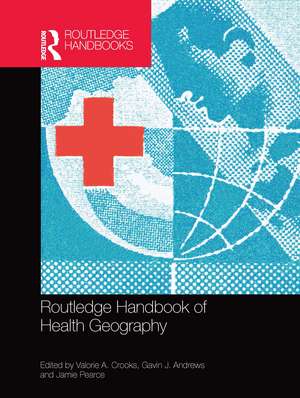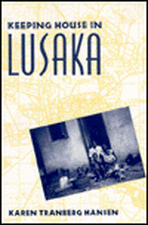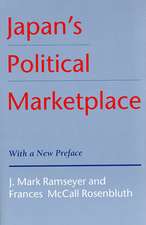Routledge Handbook of Health Geography
Editat de Valorie A. Crooks, Gavin J. Andrews, Jamie Pearceen Limba Engleză Paperback – 30 sep 2020
The Routledge Handbook of Health Geography features 52 chapters from leading international thinkers that collectively characterize the breadth and depth of current thinking on the health–place connection. It will be of interest to students seeking an introduction to health geography as well as multidisciplinary health scholars looking to explore the intersection between health and place. This book provides a coherent synthesis of scholarship in health geography as well as multidisciplinary insights into cutting-edge research. It explores the key concepts central to appreciating the ways in which place influences our health, from the micro-space of the body to the macro-scale of entire world regions, in order to articulate historical and contemporary aspects of this influence.
| Toate formatele și edițiile | Preț | Express |
|---|---|---|
| Paperback (1) | 356.63 lei 3-5 săpt. | +22.67 lei 5-11 zile |
| Taylor & Francis – 30 sep 2020 | 356.63 lei 3-5 săpt. | +22.67 lei 5-11 zile |
| Hardback (1) | 1219.41 lei 6-8 săpt. | |
| Taylor & Francis – 11 iun 2018 | 1219.41 lei 6-8 săpt. |
Preț: 356.63 lei
Nou
Puncte Express: 535
Preț estimativ în valută:
68.24€ • 71.43$ • 56.80£
68.24€ • 71.43$ • 56.80£
Carte disponibilă
Livrare economică 10-24 martie
Livrare express 22-28 februarie pentru 32.66 lei
Preluare comenzi: 021 569.72.76
Specificații
ISBN-13: 9780367659905
ISBN-10: 0367659905
Pagini: 408
Dimensiuni: 189 x 246 x 32 mm
Greutate: 0.45 kg
Ediția:1
Editura: Taylor & Francis
Colecția Routledge
Locul publicării:Oxford, United Kingdom
ISBN-10: 0367659905
Pagini: 408
Dimensiuni: 189 x 246 x 32 mm
Greutate: 0.45 kg
Ediția:1
Editura: Taylor & Francis
Colecția Routledge
Locul publicării:Oxford, United Kingdom
Public țintă
Postgraduate, Professional, and UndergraduateNotă biografică
Valorie A. Crooks is a professor in the Department of Geography at Simon Fraser University, in Canada. She currently holds the Canada Research Chair in Health Service Geographies and a Scholar Award from the Michael Smith Foundation for Health Research. She focuses on identifying ethical and equity issues associated with transnational health care mobilities.
Gavin J. Andrews is a professor in the Department of Health, Aging and Society at McMaster University, in Canada. His books include Soundscapes of Wellbeing in Popular Music (2014), Health Geographies: A Critical Introduction (2018), Geographical Gerontology (2018), and Non-Representational Theory and Health (2018).
Jamie Pearce is a professor of health geography at the University of Edinburgh, in the United Kingdom, where he is co-director of the Centre for Research on Environment Society and Health (CRESH) and director of the Scottish Graduate School for Social Science. His research seeks to understand various social, political and environmental mechanisms in health and health-related behaviour.
Cuprins
1. Introducing the Routledge Handbook of Health Geography 2. Introducing Section One: Perspectives and Debates 3. Global Health Geographies 4. Development: The Past, Present and Future Contributions from Health Geography 5. Placing Health Inequalities: where you live can kill you 6. Environmental Health Inequities: From Global to Local Contexts 7. Infectious disease geography: Disease outbreaks and outcomes through the lens of space and place 8. Risk and Resilience 9. Researching Migration and Health: Perspectives and Debates 10. Food in Health Geography 11. Un/Healthy behavior: a bibliometric assessment of geographers’ contributions to understanding the association between environment and health-related behaviour 12. Introducing Section Two: Theories and Concepts13. Environments of Health and Care: The Contributions of Political Economy 14. Humanism and Health Geography15. Social Constructivism (in a socially constructed health geography?) 16. Health geography’s role in understanding social capital and its influence on health 17. Therapeutic Landscapes: From Exceptional Sites of Healing to Everyday Assemblages of Well-being 18. Well-being in Health Geography: Conceptualizations, Contributions, and Questions 19. Decentering Geographies of Health: The Challenge of Post-Structuralism 20. Posthuman Health Geographies 21. Non-representational geographies of health 22. Introducing Section Three: Groups and People 23. The Medicalization of Homelessness 24. Informal Caregivers: People, Place and Identity 25. Mapping Life on the Margins: Disability and Chronic Illness 26. The Geographies of Indigenous health 27. Health Geographies of Aging 28. Including Children in Health Geography 29. Immigrant Health: Insights and Implications 30. Establishing Geographies of LGBTQ Health 31. This Place Is Getting to Me: Geographical Understandings of Mental Health 32. Introducing Section Four: Places and Spaces 33. Home truths? A critical reflection on aging, care and the home 34. Rethinking Care Through Transnational Health and Long-Term Care Practices 35. The Place of Primary Care Clinics 36. Palettes of Place: Green/Blue Spaces and Health 37. Urban public spaces, social inclusion and health 38. Rural Places and Spaces of Health and Health Care 39. Transportation and Health Geographies 40. mHealth Geographies: Mobile Technologies and Health in the Global South 41. Walkability and Physical Activity 42. Introducing Section Five: Practicing Health Geography 43. Qualitative Health Geography Reaches the Mainstream 44. Health geographies of art, music, and sound: The re-making of self in place 45. Health Geography and the Future of Data 46. Understanding the contribution of the ‘big data revolution’ for Health Geography 47. Navigating Research Ethics in Health Geography: The Case of Big Data 48. Spatial Modeling’s Place in Health Geography: Trends, Critiques, and Future Directions 49. Difference matters: Approaches for acknowledging diversity in health geography research 50. Practising Health Geography in Public Health: A Focus on Population Health Intervention Research 51. Intervention Research from a Place-based Approach 52. Practitioner perspectives: the case of nursing geographies ? ?
Descriere
The Routledge Handbook of Health Geography features 52 chapters from leading international thinkers that collectively characterize the breadth and depth of current thinking on the health-place connection. It will be of interest to students seeking an introduction to health geography as well as multidisciplinary health scholars looking to














